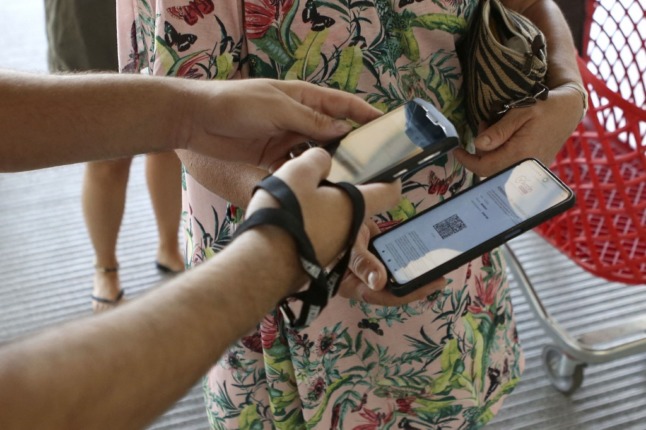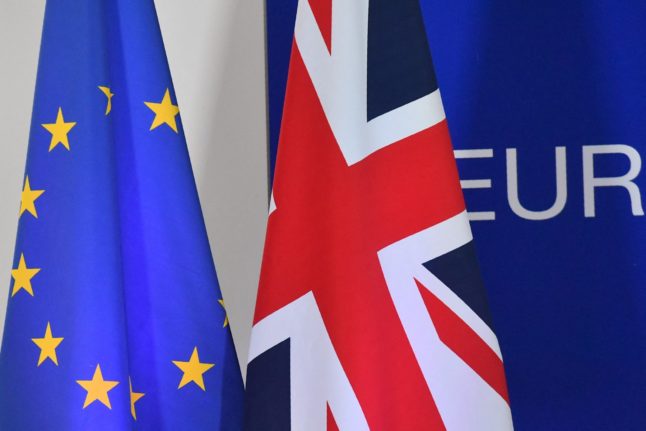As part of its strategy to hopefully avoid more lockdowns and curfews while battling the fifth wave of Covid cases, France has ramped up its vaccine booster campaign.
Vaccine boosters are now available to all adults in France, from five months after their second dose. But boosters will also be required in order to keep the health pass activated.
From December 15th, health passes for over 65s will be deactivated seven months after the date of the second injection – meaning that people have two months to get the booster jab after becoming eligible.
From January 15th, this will be extended to all over 18s, whose health pass will be deactivated seven months after their second dose.
READ ALSO Calendar: When do French health rules change?
So what does this mean if you’re travelling from a country where you are not yet eligible for a booster?
The Local has asked the French health ministry for clarification on whether anything will change under the new rules, but the regulations at present are:
Vaccinated in the EU/Schengen zone
France is part of the EU digital vaccine programme, which means those vaccinated in an EU or Schengen zone country can use their own domestic pass or vaccination certificate in France, since all QR codes are compatible.
Most EU countries are offering boosters and in general the policy around vaccines is broadly similar around the bloc. But there are some differences and in this case, as long as your own country counts you as ‘fully vaccinated’ you will be accepted as such in France.
This works the other way around too – for example Switzerland has never used the AstraZeneca vaccine in its own vaccination programme, but people vaccinated with AstraZeneca in France are accepted as ‘fully vaccinated’ in Switzerland, because their French code says they are.
Vaccinated in the UK
The UK is also offering boosters to priority groups including those with medical conditions and health workers, but if you’re not in a priority group you need to be aged 40 or over to get a booster.
The NHS app is now accepted in France and can also be integrated with the French TousAntiCovid app. NHS certificates for the booster shot did not at first contain QR codes, but the UK government has now announced that all booster shots given in England are now integrated into the NHS app, with Wales set to follow on November 29th. The devolved government of Scotland has not so far made an announcement on this.
The situation for Britons who have not had a booster seven months after their second dose is not clear at present. It is likely to follow the same rules as those vaccinated in the EU or Schengen zone, but The Local has asked for further clarification on this point.
Vaccinated outside the EU/Schengen zone or UK
For those vaccinated in other non-EU countries, obtaining the relevant codes from the French health pass has been a difficult process, with four different systems in place since the summer.
The most recent system involves people waiting until arrival in France, and then taking their vaccination certificate to a pharmacy to get the QR code required for the French health pass.
READ ALSO EXPLAINED How visitors from outside the EU can access the French health pass
Countries outside the EU have very different policies on administering booster shots, but the French government still defines ‘fully vaccinated’ for non-EU travellers as the following;
- Vaccinated with a vaccine accepted by the European Medicines Agency (Pfizer, Moderna, AstraZeneca or Johnson & Johnson/Janssen)
- At least 28 days after the single shot Johnson & Johnson/Janssen
- At least seven days after the second shot of Pfizer, Moderna or AstraZeneca
- At least seven days after a single shot of Pfizer, Moderna or AstraZeneca in the case of people who have recovered from Covid
Boosters are only required in travel terms for people vaccinated with Sinopharm or SinoVac vaccines, which are not yet approved by the EMA. In this case, people who have those vaccines plus a booster dose of either Pfizer or Moderna are accepted as fully vaccinated seven days after the booster shot.
Children
The booster requirement for the French health pass concerns only over 18s.
Since most countries only began vaccinating children over the summer, the issue of boosters for children has not yet arisen.
If you are travelling with a child over the age of 12, however, be aware that they too require a health pass.
Other options
Unlike some parts of Austria and Germany which have exchanged the health pass for a vaccine pass, the French pass can, for now, still be used with a negative Covid test.
Those who either are not vaccinated or whose home country vaccination certificate will not be accepted for the French pass, can take a Covid test in France and, if negative, use the result to access the benefits of the health pass for 24 hours.
READ ALSO How tourists and visitors can get a Covid test in France
Although the official policy is that only EU/Schengen vaccination certificates are accepted in France, we have heard anecdotal evidence that other certificates, particularly the American CDC card, is accepted by some bars and restaurants.
Changes
Policy in this area can change rapidly. For all the latest, keep an eye on our Travelling to France section.



 Please whitelist us to continue reading.
Please whitelist us to continue reading.
The problem is that I am finding it impossible to get the troisième dose, before my Covid pass is deleted! There needs to be more time before such a thing is put into action. In relation to my vaccination in early July I should be given a bit more leeway … I think I will be lucky to have the 3rd jab at the end of March or April.
I keep hammering away at Doctolib with varying degrees of success. Just reading your note now, I tried again for the second time this morning. All the opportunities are far but still accessible by transit and I just found a handful available this week (2 December on) at a vaccination center in Sarcelles. I love the street location: Route des Refuzniks. 😀
All I can say is this. Get your vaccinations as soon as they become available. It is in your best interest, and more important, in the best interest of the entire community. I have now lost two friends to Covid. Both were adamant — they didn’t “believe in vaccinations”. I am sorry that they are gone, but they made their decisions. I would hope that others would step up and do what is right.
I have a booster in the US. Could you provide information on how to add it to my current double vaccination status on the anti-Covid app?
All three shots are Pfizer.
https://www.sante.fr/how-to-obtain-a-french-health-pass
We had our vaccinations in the U.K. but a third dose here in France as a booster. The vaccine centre didn’t know how to call this a booster so it 1 of 2 on our pass. Does anyone know how this can be registered here in France as a booster on the Tous antiCovid app?
I went ‘sans rendezvous’ to my local vaccination centre yesterday and got the troisieme. I am one of those who would be de-activated because of age. I suggest you go to one of the big vaccination centres without a Doctolib appointment. They are so keen to get you in the system I doubt you;d be turned away.